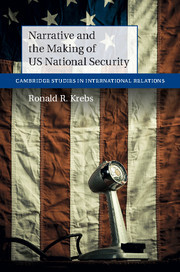Description
Narrative and the Making of US National Security
Cambridge Studies in International Relations Series
Author: Krebs Ronald R.
This book shows how dominant narratives have shaped the national security policies of the United States.
Language: English
Subject for Narrative and the Making of US National Security:
Approximative price 36.43 €
In Print (Delivery period: 14 days).
Add to cart
Narrative and the Making of US National Security
Publication date: 08-2015
414 p. · 15.7x23.4 cm · Paperback
Publication date: 08-2015
414 p. · 15.7x23.4 cm · Paperback
Approximative price 105.49 €
In Print (Delivery period: 14 days).
Add to cart
Narrative and the Making of US National Security
Publication date: 08-2015
414 p. · 15.5x23.6 cm · Hardback
Publication date: 08-2015
414 p. · 15.5x23.6 cm · Hardback
Description
/li>Contents
/li>Biography
/li>
Dominant narratives - from the Cold War consensus to the War on Terror - have often served as the foundation for debates over national security. Weaving current challenges, past failures and triumphs, and potential futures into a coherent tale, with well-defined characters and plot lines, these narratives impart meaning to global events, define the boundaries of legitimate politics, and thereby shape national security policy. However, we know little about why or how such narratives rise and fall. Drawing on insights from diverse fields, Narrative and the Making of US National Security offers novel arguments about where these dominant narratives come from, how they become dominant, and when they collapse. It evaluates these arguments carefully against evidence drawn from US debates over national security from the 1930s to the 2000s, and shows how these narrative dynamics have shaped the policies pursued by the United States.
1. Narrating national security; Part I. Crisis, Authority, and Rhetorical Mode: The Fate of Narrative Projects, from the Battle against Isolationism to the War on Terror: 2. Domination and the art of storytelling; 3. Narrative lost: missed and mistaken opportunities; 4. Narrative won: opportunities seized; Part II. Narrative at War: Politics and Rhetorical Strategy in the Military Crucible, from Korea to Iraq: 5. The narrative politics of the battlefield; 6. Tracking the Cold War consensus; 7. Tracing the Cold War consensus; 8. Puzzles of the Cold War, lessons for the War on Terror; 9. Narrative in an age of fracture; Appendices.
Ronald R. Krebs is Associate Professor in the Department of Political Science at the University of Minnesota. He is the author of Fighting for Rights: Military Service and the Politics of Citizenship (2006) and co-editor of In War's Wake: International Conflict and the Fate of Liberal Democracy (Cambridge, 2011). His articles on a wide range of topics in international relations have appeared in leading scholarly journals, including International Organization, International Security, the European Journal of International Relations, and Security Studies, as well as in outlets such as Foreign Affairs, ForeignPolicy.com, Slate, and the Washington Post.
© 2024 LAVOISIER S.A.S.




